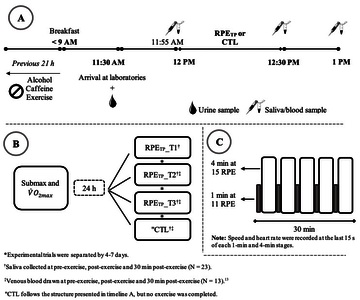Leal, D, Taylor, L and Hough, J 
Preview |
Text
1393134_Hough.pdf - Post-print Download (305kB) | Preview |
![Figure [thumbnail of Figure]](https://irep.ntu.ac.uk/41988/2.hassmallThumbnailVersion/1393134_Hough_Figure%201.jpg)  Preview |
Image (Figure)
1393134_Hough_Figure 1.jpg - Supplemental Material Download (102kB) | Preview |
Preview |
Text (Table)
1393134_Hough_Table 1.pdf - Supplemental Material Download (120kB) | Preview |
Abstract
Purpose: Physical overexertion can lead to detrimental overreaching states without sufficient recovery, which may be identifiable by blunted exercise-induced cortisol and testosterone responses. A running test (RPETP) elicits reproducible plasma cortisol and testosterone elevations (in a healthy state) and may detect blunted hormonal responses when overreached. This current study determines the salivary cortisol and testosterone responses reproducibility to the RPETP, to provide greater practical validity using saliva compared to the previously utilized blood sampling. Secondarily, the relationship between the salivary and plasma responses will be assessed.
Methods: Twenty-three active, healthy males completed the RPETP on three occasions. Saliva (N=23) and plasma (N=13) were collected Pre-, Post- and 30 min Post-Exercise.
Results: Salivary cortisol did not elevate in any RPETP-trial, and reduced concentrations occurred 30 min Post-Exercise (P = 0.029, η2 = 0.287); trial differences were observed (P < 0.001, η2 = 0.463). The RPETP elevated (P < 0.001, η2 = 0.593) salivary testosterone with no effect of trial (P = 0.789, η2 = 0.022). Intra-individual variability was 25% in cortisol and 17% in testosterone. ‘Fair’ ICCs of 0.46 (cortisol) and 0.40 (testosterone) were found. Salivary and plasma cortisol positively correlated (R = 0.581, P = 0.037) yet did not for testosterone (R = 0.345, P = 0.248).
Conclusions: The reproducibility of salivary testosterone response to the RPETP is evident and supports its use as a potential tool, subject to further confirmatory work, to detect hormonal dysfunction during overreaching. Salivary cortisol responds inconsistently in a somewhat individualized manner to the RPETP.
| Item Type: | Journal article |
|---|---|
| Publication Title: | International Journal of Sports Physiology and Performance |
| Creators: | Leal, D., Taylor, L. and Hough, J. |
| Publisher: | Human Kinetics |
| Date: | 21 February 2021 |
| ISSN: | 1555-0265 |
| Identifiers: | Number Type 10.1123/ijspp.2020-0541 DOI 33477109 PubMed ID 1393134 Other |
| Divisions: | Schools > School of Science and Technology |
| Record created by: | Linda Sullivan |
| Date Added: | 11 Jan 2021 09:11 |
| Last Modified: | 31 May 2021 15:06 |
| URI: | https://irep.ntu.ac.uk/id/eprint/41988 |
Actions (login required)
 |
Edit View |
Statistics
Views
Views per month over past year
Downloads
Downloads per month over past year

 Tools
Tools Tools
Tools




